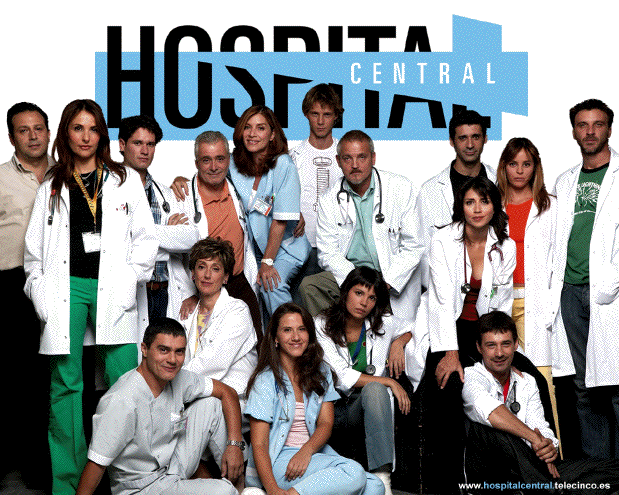Hospital central is an acclaimed Spanish series that is kind of like ER on steroids. Later in this article, you’ll see what Hospital central has to do with anachronisms.
During a recent translation/localization project for a major NLE manufacturer, my friend Rub©n Abruña and I ran into a conundrum when debating with our client about how a few words should be translated. Among them was the word Slate, which Rub©n and I (and everyone else we personally know in Spain and Latin America) had called Pizarra. We were quite shocked when our client told us that they wanted to use the word Claqueta, which actually corresponds with the word Clapstick. For us, the difference between a Slate and a Clapstick were clear: A Slate just shows information. While a Clapstick may show information, it always has a sound-producing “clapper” which was created to facilitate synchronizing audio and video in post. In fact, as far as we are concerned, both Clapstick and Claqueta are onomatopoeia, or words that were created to imitate the sound created by the device. For that reason, Rub©n and I were quite clear about why we called a Slate as a Pizarra, and a Clapstick as a Claqueta. However, I began to discuss this with industry colleagues in Latin America/Spain, delve into the etymologies of each term, and discovered that -whether we like it or not, even Slate (Pizarra) is an anachronism.
What’s an anachronism?
Here’s the Apple dictionary definition:
a thing belonging or appropriate to a period other than that in which it exists, esp. a thing that is conspicuously old-fashioned : everything was as it would have appeared in centuries past apart from one anachronism, a bright yellow construction crane.
Why Slate (Pizarra) are anachronisms
Slate (pizarra) is actually the name of a type of a rock. Here is the Wikipedia definition:
Slate is a fine-grained, foliated, homogeneous metamorphic rock derived from an original shale-type sedimentary rock composed of clay or volcanic ash through low grade regional metamorphism. The result is a foliated rock in which the foliation may not correspond to the original sedimentary layering. Slate is frequently grey in color especially when seen en masse covering roofs. However, slate occurs in a variety of colors even from a single locality. For example slate from North Wales can be found in many shades of grey from pale to dark and may also be purple, green or cyan. Slate is not to be confused with shale, from which it may be formed, or schist.
Both Slate in English (and pizarra in Castilian) are used anachronistically to refer to several things, including the information sign we use at the beginning of film and video takes, or at the beginning of programs. In Spain and Latin America, pizarra is also used to refer to what we in the USA also call a blackboard, even though few are actually made of slate anymore. (Yet another anachronism.)
More anachronisms in the podcasting and video world
- reel (as in demo reel, even when it’s a digital file)/bobina (in Spain)
- rewind (when used to refer to a digital file)/rebobinar
- Stay tuned (in a podcast)/Mant©ngase en sintonía
- To film (in a video shoot)/filmar
Anachronisms in telephony
- Hang up (the phone, even when using a cordless or mobile phone)/colgar (enganchar, but only in Puerto Rico)
- To dial (even though very few phones have a dial anymore)/discar
Anachronisms in the Spanish TV series Hospital central
For those readers who aren’t familiar with it, Hospital central is an acclaimed Spanish TV series which is kind of like ER on steroids. The series started back in 2000 and is still on the air today in its 17th season. In fact, I recently read that it is the longest lasting weekly series in Spanish television’s history to date. I recall a scene where a hospital employee was consoling a suicidal patient who was looking for a reason to live. I don’t know whether the anachronism was in the script or impromptu from the actor of about 32 years old, but he described having helped his grandfather cut the grass and how his grandfather would give him €8 (8 euros). Well, when a 32-year old Spaniard was 8-years old, there weren’t any euros yet. Perhaps someone from the Hospital central crew in Madrid will write in and tell us!
Anachronisms in public bathrooms
At least in Latin America, many people refer to “flushing the toilet” as “bajar la cadena” (“pull the chain”), despite the fact that almost no public toilets even have a chain anymore (not even internally).
What should we do about anachronisms?
I like to be quite precise when I express myself. I’d like to avoid using anachronisms whenever possible. However, I recognize that there are many cases where there isn’t a good modern equivalent. How else should we call a Slate (in a single word)? How else should we refer to “rewinding” a video that’s actually a video file. How else should we say “hang up the phone”, or “s/he hung up on me”? Your comments are welcome below!
Thanks to Neil
Thanks to Neil D. Littauer, who reminds me the word anachronism whenever I forget it 🙂
Allan T©pper’s articles and seminars
Get a full index of Allan T©pper’s articles and upcoming seminars at AllanTepper.com. Listen to his podcast TecnoTur, together with Tanya Castañeda, Rub©n Abruña, and Liliana Marín, free via iTunes or at TecnoTur.us.

